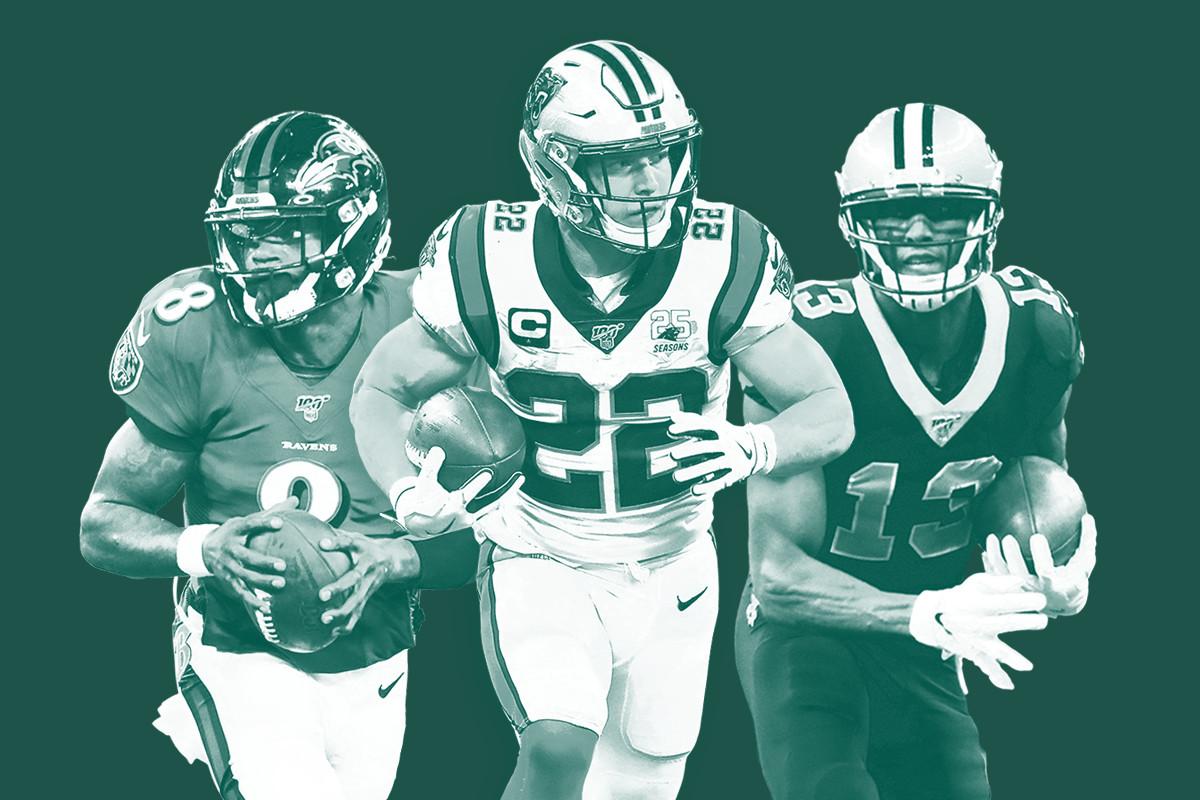Remember when we all thought the Browns were the NFL’s next dominant team? Or that Carson Wentz was a no-brainer future MVP? Or that Sean McVay was the league’s next great mastermind? Some of the NFL’s teams, players, and coaches who were in the spotlight the past few seasons enter 2020 with tempered expectations—but that doesn’t mean we should count them out. Welcome to The Ringer’s Post-Hype Week, when we revisit some of the league’s biggest story lines from seasons past that aren’t getting as much love ahead of this campaign.
Carson Wentz heads into the 2020 season looking to get himself out of quarterback limbo. The 27-year-old Eagles starter has somehow been labeled both overrated and underappreciated, the product of contrasting flashes of supreme talent and frustrating inconsistency. Wentz is paid like a top-three player in the league―at least according to his $107 million in guarantees―but he has yet to cement himself among the elite players at the quarterback position.
Battling injuries, coaching turnover, a marked lack of receiver talent, and even a minor quarterback controversy at different points over the past two seasons, Wentz has struggled to match his incredible breakout performance in 2017―an MVP-caliber campaign that was unfortunately cut short by a late-season ACL tear. Coming off back-to-back seasons of good-but-not-great results, expectations vary wildly for the fifth-year pro. With that in mind, let’s dive deep into Wentz’s numbers and tape to try to answer the question: Was his 2017 season an anomaly, or can he get back to his MVP form in 2020?
What Do the Stats Say?
Wentz’s brilliant 2017 season set the bar for the former second overall pick’s realistic upside and potential. Through Week 14 of that season (when he suffered a torn ACL in a win over the Rams), Wentz had tossed a league-best 33 touchdowns to just seven picks, had averaged 8.3 adjusted net yards per pass (sixth among regular starters), and notched a 101.9 passer rating (fifth). He finished the year ranked fifth in Pro Football Focus’s passing grade (84.7), first in QBR (78.5), and sixth in Football Outsiders’ DVOA (23.8 percent). Really, the only black mark on his stat line was a lackluster 60.2 percent completion rate, which tied for 25th among qualifying quarterbacks.
Wentz improved in that column in 2018, though. After sitting out the season’s first two games rehabbing his knee, he posted a career-best 69.6 percent completion rate while boosting his passer rating (102.2) in 11 starts. However, besides those two metrics, his numbers dropped pretty much across the board: He tallied a 21-to-7 touchdown to interception ratio, finishing 14th in PFF’s passing grade (78.5), 12th in QBR (62.0), and 12th in DVOA. For the #QBWinz crowd, he led the defending Super Bowl champs to a disappointing 5-6 record before being shut down in Week 15 with a back injury. (Nick Foles went 4-1 in his five starts, by the way, and led the team to a playoff berth and wild-card win over the Bears. Philly bowed out in the divisional round.)
In 2019, Wentz played a full 16-game regular-season slate for the first time since his rookie season, tossing 27 touchdowns to seven interceptions. His marks in completion rate (63.9 percent), PFF passing grade (74.5), QBR (60.8), and DVOA (0.1 percent) all regressed again, though, and the Eagles offense was a mostly middling group as it struggled to make up for key losses at receiver (both DeSean Jackson and Alshon Jeffery missed much of the year). Wentz was left throwing passes to a rag-tag group of rookies, practice squad call-ups, and a former AAF star. Despite those limitations, Wentz led the Eagles to a 9-7 record on the back of a four-game win streak to end the season that earned the team a postseason berth. That run came to a disappointing end, though, as Wentz was forced out of the team’s wild-card loss to the Seahawks with a concussion.
The Wow-Play Factor
While a few oft-cited and reliable stats show Wentz’s slight decline over the past two seasons, there are a few encouraging signs that a bounce-back year could be in the cards. For starters, his performance under pressure has improved dramatically: After posting a 53.2 percent adjusted completion rate under pressure in 2017 (28th among passers with 300-plus dropbacks, per Pro Football Focus), that number jumped to 68.2 in 2018 (ninth) and held relatively steady in 2019 at 65.6 percent (also ninth). His 10 touchdown passes under pressure last season tied for tops in the NFL, and PFF credited him with 14 big-time throws (i.e., highly-graded, precise downfield passes) under pressure on the year, tied for third-most leaguewide. He produces the types of “wow” plays that can change the course of a game.
Those big plays overshadow his mistakes. The fifth-year pro possesses rare physical gifts, combining a big, solid frame with a very strong arm and plenty of mobility, and when he puts it all together on the football field, it’s a sight to behold. Wentz almost looks more comfortable making sandlot plays out of the structure of the offense, darting, strafing, and escaping the pass rush only to find his man downfield for a big play.
His top-tier arm strength and natural field vision allows him to make throws that few NFL quarterbacks are capable of. This dart into the back of the end zone in the team’s Week 14 win over Washington had me picking my jaw up off the floor. This is a ridiculous throw.
Wentz can mix his velocity from play to play, though, loading up and uncorking a fastball on one throw …
… before lofting a feathery touch pass to the sideline on the next.
He’s also aggressive in his mindset, never afraid to push the envelope and thread the needle into tight coverage. He trusts his arm, and he trusts his receivers.
What’s Holding Wentz Back?
If we judged quarterbacks only by their most exciting, highest degree-of-difficulty plays, Wentz would be among the league’s top tier. When he’s on, he’s on. But you could probably say the same thing about Jameis Winston, too―and Wentz has not been immune to getting throws out late, missing open receivers, or making back-breaking turnovers.
Daniel Jones got plenty of flak for his league-worst 18 fumbles in 2019, and it’s an issue that causes some concern for his long-term future in the league. Wentz, though―a far more experienced player―wasn’t too far behind the Giants rookie. The Eagles’ signal-caller ended the year with 16 fumbles (second worst), losing seven to opponents. On far too many plays, fumbles were the product of Wentz trying to do too much, refusing to just take the sack and live to play another down. Here are two examples from that Week 14 game against Washington.
Wentz has the size and power to shrug pass rushers off and escape to keep the play alive, but that’s proved to be a double-edged sword at times. He needs to clean up his ball security in 2020.
Injuries hit the Eagles hard in 2019, too, and that had an undeniable effect on Wentz’s overall performance. When Jackson went out with a core injury after Week 2, Philly’s lack of speed became a real issue. Instead of leaning on their quarterback’s powerful arm and airing the ball out consistently, Philly had to rely on far more short and intermediate routes as the foundation of the passing game. Without the ability to produce explosive plays (they finished with just six pass plays of 40-plus yards on the year, third fewest―and two came from Jackson in Week 1), the team was forced to string together long, sustained drives. That’s not easy, yet somehow the Eagles finished the season with an incredible 23 scoring drives of 10-plus plays.
Philadelphia went all out over the offseason to fix this major issue. The team made TCU speedster Jalen Reagor their first-round pick, and he’s a perfect fit for their speed-starved offense and should contribute right away. The Eagles added a couple more deep playmakers in John Hightower and Quez Watkins in the middle rounds. And they will be getting Jackson back from injury. That could be a massive boon for Wentz in Year 5.
Of course, the lack of speed and talent at receiver isn’t the only reason Wentz’s numbers dipped in 2019. There were a few too many times when he simply made poor throws, either delivering the ball late or inaccurately. He needs to clean up these types of inexplicable misses.
Wentz finished in the top 10 in the NFL’s completion percentage above expectation metric (which measures a quarterback’s performance relative to the difficulty of their throws on an aggregate level) in 2017 and 2018. In 2019, he dropped all the way down to 23rd in that statistic, just behind Mitchell Trubisky. I believe positive regression is coming.
Outlook for 2020 and Beyond
It’s worth noting that the question asked in this piece―whether Wentz can get back to his MVP form in 2020―is, well, probably not completely fair. It’s not reasonable to expect former MVPs like Matt Ryan or Cam Newton to consistently re-create their MVP-season numbers, nor is it likely that others like Patrick Mahomes and Lamar Jackson will statistically better their respective MVP performances year in and year out. Just about every MVP winner over the last decade has benefited from an alignment of the stars in various areas, whether that’s coaching, scheme, supporting cast, schedule, a little luck―or all of the above.
That was obviously true for Wentz during his bar-setting 2017 campaign, as evidenced by the Eagles’ magical Super Bowl run under backup quarterback Nick Foles. Instead of zeroing in on statistical benchmarks that could pull Wentz out of his current status as an “enigma” and into full-blown superstar mode, then, it probably makes more sense to look at the big picture variables at play. Wentz has a near-ideal skill set and natural arm talent. He’s proved he can perform well under pressure, that he is extraordinarily gifted as an out-of-structure improviser, and that he brings a strong arm and aggressive mentality to the table. And, crucially, the team- and season-specific stars may be realigning for Wentz to make a big leap back to MVP-caliber play in 2020. Philly’s expected to roll out a new-look, innovative scheme under forward-thinking head coach Doug Pederson, a system that should get a massive boost from the return of Jackson, the team’s infusion of young field-stretching playmakers, and a potential Taysom Hill–like utility playmaker and second quarterback in Jalen Hurts. Add in Wentz’s “dad bod” upgrade to 250 pounds, which could help protect him from wear and tear and the prospect of another injury-shortened season, and the pieces are in place for Wentz’s long-awaited breakthrough.

